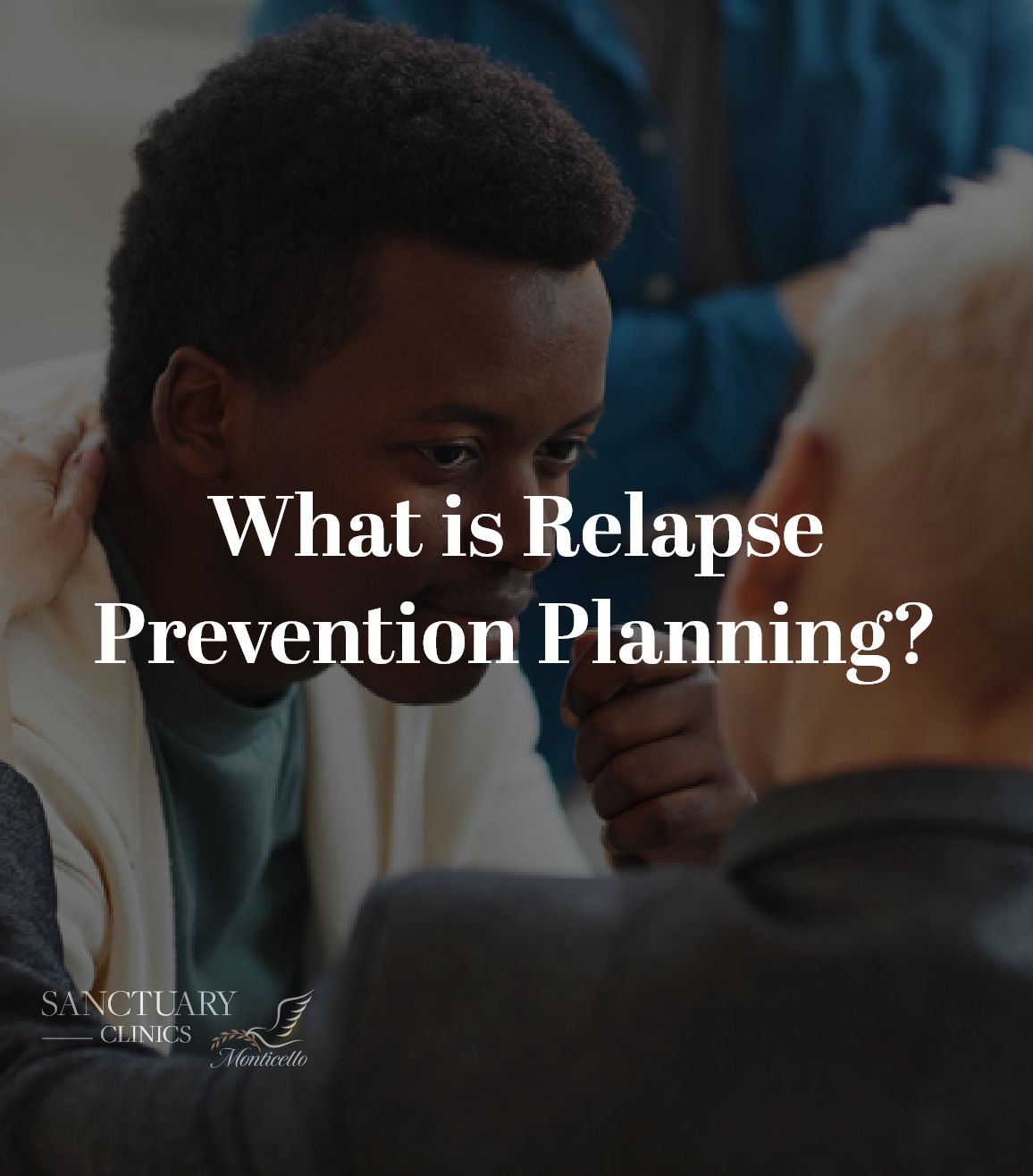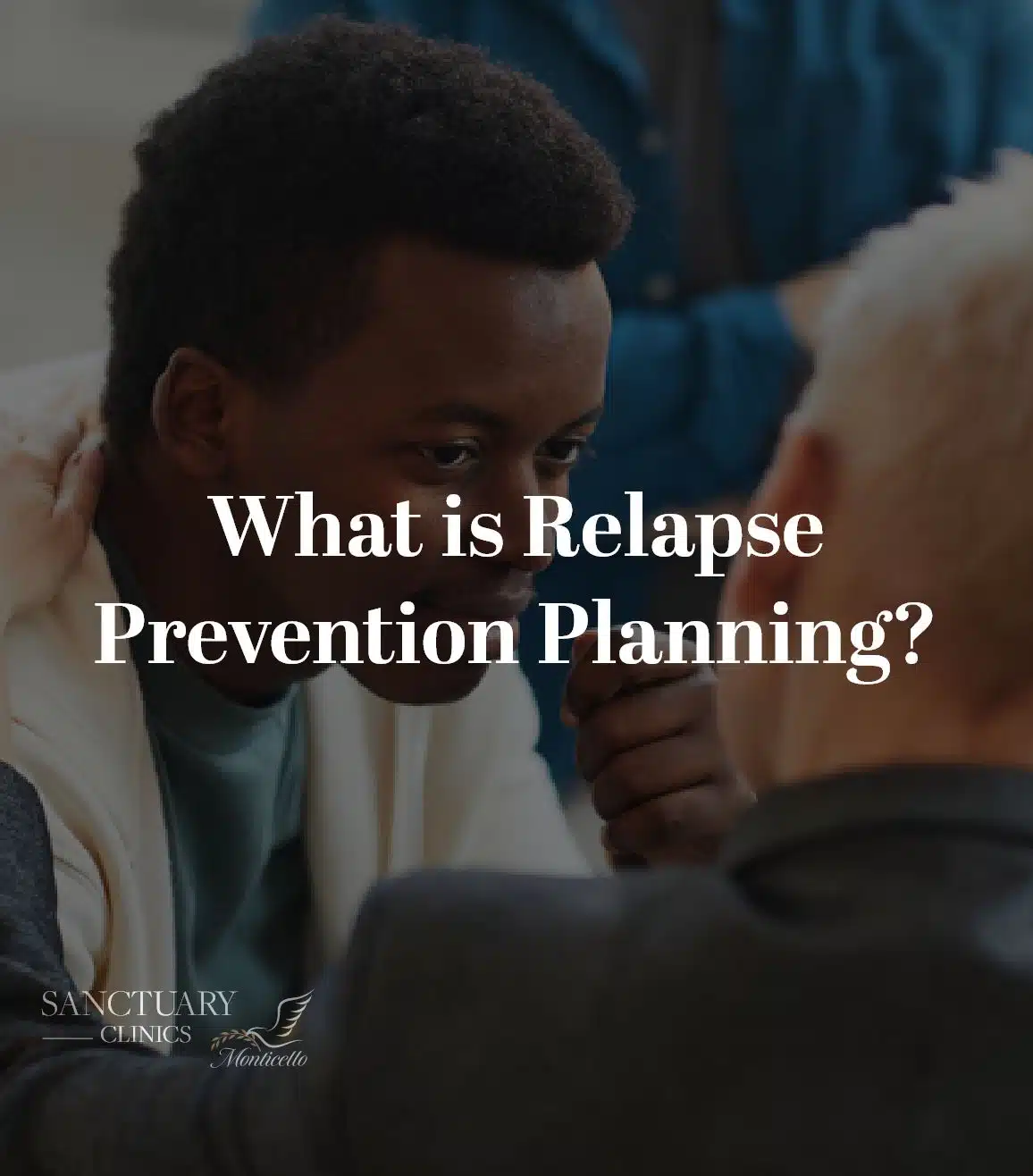

Contents
What is Relapse prevention planning?
Relapse prevention planning is a crucial component of the recovery process that prevents the risk of relapse. It is for individuals who have undergone treatment for addiction or mental health issues.
At Sanctuary Clinics, we understand that the journey to recovery is not just to overcome the initial hurdles.
It is also to maintain that progress over time to avoid future relapse. This is where Relapse Prevention Planning comes into play. It helps to make sure that an individual who has decided to quit his addiction does not relapse.
For getting a successful result, a personalized plan is designed that will keep the individual in check and not get triggered. It includes relapse prevention tools and techniques to lower the likelihood of relapse.
Here are some of the following things that a plan can include:
Relapse has many different stages as well including
The different stages of relapse can have different challenges. A relapse prevention plan, therefore, makes sure that an individual is on track. To know more about Relapse prevention planning, keep on reading.
What are the goals of a Relapse prevention plan?
There are many goals of a relapse prevention plan.
Of course, the biggest and final goal is abstinence.
The objective is to stop an individual from relapsing.
There are many goals of a relapse prevention plan. Of course, the biggest and final goal is abstinence. The objective is to stop an individual from relapsing.
And, ultimately to foster a sustained improved quality of life. However, it is not an easy journey. There are many roadblocks along the way. A plan makes sure that those roadblocks can be easily navigated without any pitfalls.
Here are some goals in recovery of a relapse prevention plan
At Sanctuary Clinics, we are aware that getting to the other end of the tunnel is never easy.
But, our treatment team of dedicated professionals collaborates with you to identify potential pitfalls and develop coping strategies.
We make sure that the treatment program and the plan of action meet the needs of the individuals.
What should be in a Relapse prevention plan?
A comprehensive relapse prevention plan should have different strategies that ensure that an individual is having a safe recovery journey.
Of course, it does not happen without dedication and commitment. There are different coping strategies and skills to be followed.
Substance abuse prevention
The primary and most important thing that should be in a relapse prevention plan is substance abuse prevention.
Completely quitting substance abuse and compulsions is not easy work. But a prevention plan helps to navigate the path. You get to list specific situations, emotions, and thoughts that could trigger your cravings or lead to relapse.
Not only will you be staying away from drugs or alcohol, but you will also avoid the triggers.
Staying away from the triggers is the main thing that is focused on in a prevention plan.
To achieve that, different strategies are used so that the stressors and triggers are in check. Mindfulness and meditation are one of the most widely used and effective strategies for that.
According to the Journal of Addiction Medicine, Mindfulness-based relapse prevention can be highly successful for substance use disorders.
Relapse warning signs
In a relapse prevention plan, it is also very important to identify early warning signs that indicate you might be at risk of slipping back into old patterns.
The team of professionals is vigilant about your behavior and emotions and analyzes them to make sure you are not facing any risk. Warning signs are indicators that show something is not right and therefore, the chances of relapse are heightened. The warning signs differ for every person in recovery.
However, here are some examples of relapse warning signs of relapse to look out for:
- Increased cravings
- Isolation
- Neglecting self-care
- Rationalizing substance use
- Mood changes
- High-risk situations
Remember, the triggers differ from person to person. They might be hidden in everyday life that can be difficult to identify.
Relapse triggers
As mentioned, relapse triggers are certain thoughts or situations that can compel an individual to fall back into the old patterns.
A big part of a good relapse prevention plan is to stay away from such triggers. Depending on the individual, the triggers can be a wide range of things. It could be something minute or something major as well.
Regardless, the idea is to identify those triggers and control them as much as possible. Some of the common triggers can be:
However, here are some examples of relapse warning signs of relapse to look out for:
- Work stress
- Stressful situations
- Social pressure
- Negative emotions
Being aware of these triggers and developing strategies to manage them is a fundamental aspect of a relapse prevention plan.
It is not possible to completely avoid these triggers. For instance, you cannot always get out of work stress. It is a part of life. However, you have to come up with ways and strategies that will help you manage them.
Support system
Unfortunately, relapse is a part of several recovery journeys. Once you are deep in it, it can be difficult to get yourself out. That said, there are methods to avoid it.
And, having a support system is one such method. There is a popular saying that goes like “Relapse starts before you pick up your first drink or drug”. But many individuals do not have the support of their close individuals.
As a result, they seek the comfort of drugs and alcohol. Even during the relapse prevention period, it is very important to surround yourself with supportive people who will encourage you. You can communicate with your support network about your substance abuse history and your commitment to staying sober.
There are many support groups and treatment centers that help provide support and community to those who lack it.
It becomes easier to go through challenging times when you have somebody to fall back on like a friend or family.
What should be in a Relapse prevention plan?
You can get relapse prevention therapy from many places. There are addiction treatment centers that offer specialized programs for such cases. At Sanctuary Clinics, we offer to help individuals navigate through their recovery journey easily without major setbacks.
We believe in equipping you with the practical tools needed to face life’s uncertainties while staying committed to your recovery. Other than addiction treatment centers, there are also therapists and counselors that you can reach out to.
Those who have experience in addiction treatment can help provide a Relapse prevention plan. There are also outpatient programs that offer structured support. You can continue your daily activities while you receive professional help.
There are also support groups that offer 12-step programs. There are many such as Alcoholics Anonymous or Narcotics.
Anonymous. Support groups have been proven to be quite effective.
This is because you are in the presence of other individuals who are on their path to recovery. You get to listen to their stories and there is shared empathy that helps in the ongoing recovery process.
Lastly, there are also many online resources available. There are different websites and self-help materials with the help of which you can come up with a plan to manage your triggers.
Doing it yourself requires more dedication without somebody guiding you.
But it can be done. A lot of people refuse to seek help because of judgment.
However, the important thing to remember is that you are trying for a better life free of substance use. That is all that matters.
Is there Relapse prevention counseling?
Yes, there is relapse prevention counseling. It’s a type of counseling that’s all about understanding you as an individual.
There are therapy sessions that address your challenges, your strengths, and what might trigger those old urges. Together, you and your counselor work on strategies to handle tough moments.
When cravings hit or situations get tricky, you can fall back into your old patterns. However, a counselor can help you cope with challenges, maintain sobriety, and seek support. The goal is long-term recovery.
Therefore, counselors get to the root of the matter so that old urges can be managed in the future as well.
Where do I find Relapse prevention education?
You can find relapse prevention education in a variety of places. Here are some of them:
- Addiction treatment centers
- Online resources
- Books and Literature
- Community health centers
They can help you devise a recovery plan and treatment plan and stick to them. The best way to go about it is to find a community health center near you and ask for resources.
They hold many workshops or seminars that can guide you on addiction recovery.
There are also countless videos, articles, and guides on the internet about relapse prevention strategies.
These can teach you about healthy coping skills, relaxing techniques, and even how to maintain a healthy lifestyle.
At Sanctuary Clinics, we always emphasize patient education as well. Our goal is to make sure that individuals seeking treatment are aware of their own challenges. For that reason, our team of professionals is keen on educating individuals about different conditions. Recovery is a lifelong process. It is not just about staying away from addictive substances. It is also about meeting your personal goals and maintaining your physical health or psychological health. Normal functioning makes sure that you do not experience risks of relapse or completely give way to drugs and alcohol.



